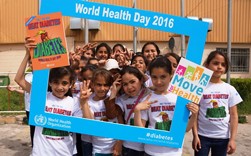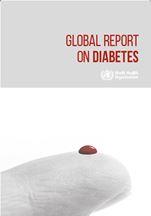 18 April 2016 – Under the patronage of HRH Princess Muna Al Hussein, WHO in Jordan and the Ministry of Health, in collaboration with local partners, marked the celebration of World Health Day this year with a number of activities aimed at spreading awareness of diabetes, the theme of this year's campaign.
18 April 2016 – Under the patronage of HRH Princess Muna Al Hussein, WHO in Jordan and the Ministry of Health, in collaboration with local partners, marked the celebration of World Health Day this year with a number of activities aimed at spreading awareness of diabetes, the theme of this year's campaign.

The Minister of Health Dr Ali Hyasat said that over the past few decades Jordan had witnessed significant demographic changes and progress in health. Communicable diseases, as leading causes of morbidity and mortality in Jordan, were being addressed, and noncommunicable diseases, such as diabetes and cancer, were increasing in prevalence, linked to higher standards of living and diets high in fat and sugar.
The President of the National Center for Diabetes Endocrinology and Genetics Professor Kamel Ajlouni pointed out the link between diabetes and a number of serious diseases, and the economic cost and burden to Jordan.
WHO Representative to Jordan Dr Maria Cristina Profili said that everyone had a role to play in fighting noncommunicable diseases and halt the rise in diabetes, “Governments have committed, most recently in the 2030 agenda for Sustainable Development Goals, to reduce premature mortality from noncommunicable diseases, including diabetes. Individuals, at the same time, need to take responsibility for their own health through simple lifestyle measures for preventing or delaying the onset of diabetes. These measures include engaging in regular physical activity, maintaining a healthy weight and eating healthy food,” said Dr Profili.
With physical activity playing a big part in improving the lifestyle of all Jordanians, the Jordanian Olympic Committee enlisted the support of some of the country's biggest athletes to join children in a morning of fun-filled activities. Hundreds of children were given the opportunity to learn about a number of sports from the stars themselves, who taught them the importance of staying healthy throughout their lives.
At the end of the event HRH Princess Muna presented certificates of merit to the winners of the World Health Day art competition from 3 schools.
The numbers speak for themselves. With 422 million adults affected, there are 4 times more people with diabetes today than there were in 1980. Diabetes is rising fastest in the world’s low- and middle-income countries. In its first global report on diabetes WHO highlighted the need to step up prevention and treatment for diabetes.
Related links
Video featuring Jordanian Olympic sports stars (in Arabic)


 Global report on diabetes
Global report on diabetes
